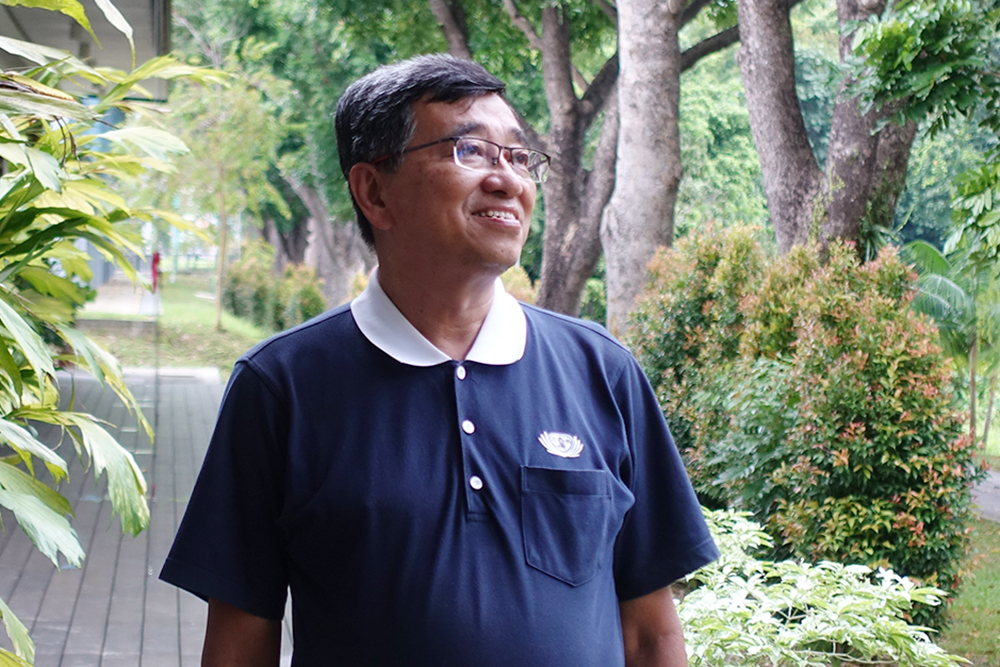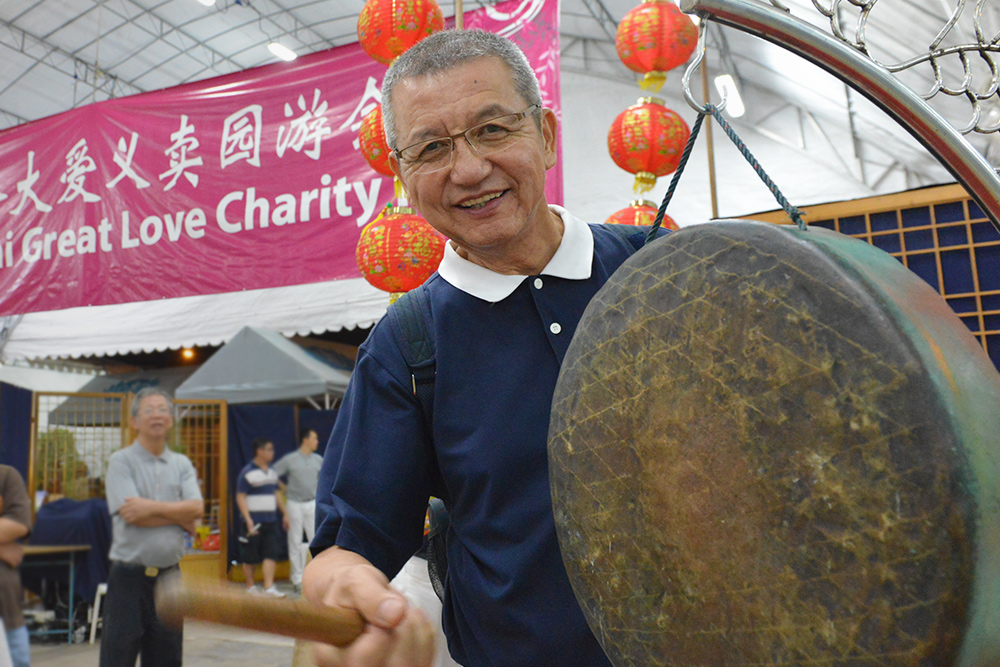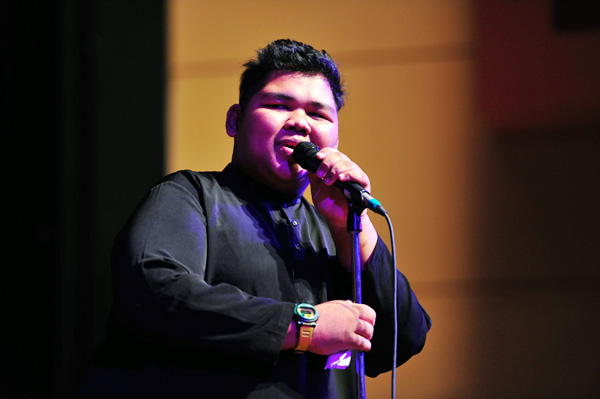
In 1970s Singapore, amidst the neon lights and nightlife, the son of a bar and nightclub owner stood on a rooftop terrace, watching drunken patrons stumble out and hostesses with their makeup still smeared. Silently, he asked himself: “Is this how I am meant to live my life?”
Meet Keng Lim. From being the son of a bar and nightclub owner, he became an entrepreneur at 28, achieving financial freedom and semi-retirement by the age of 36. Now 69, he serves voluntarily as Deputy CEO of Tzu-Chi Foundation (Singapore), dedicating over two decades to charitable work.
Growing up amidst the glow of city lights
Keng Lim, born in 1956, is a child of Singapore’s founding generation.
He spent much of his childhood hanging around mid-to-upscale nightclubs that were run singlehandedly by his father. In an era with few entertainment options, bars and nightclubs were the go-to spots after cinemas. Office workers, businessmen, and tourists would come here to have a drink, dance, or confide in hostesses.
“In the eyes of outsiders, nightclubs are unsavoury places. But in reality, most people are just having a drink and a chat,” Keng Lim opined.
As the eldest son, his father often took him along to the nightclubs. In his early teens, he became familiar with both the glamour and the loneliness of the adult world — he was able to differentiate between the best-selling cigarette brand, the most expensive bottle of liquor, and recognise the latest hits from Hong Kong and Taiwanese singers. A world of sights and sounds that seemed unreachable to other children was everyday life for him.

Yet even in this very environment, Keng Lim did not succumb to debauchery. Instead, he began to observe quietly: hostesses who shone with youth and glamour in their twenties, were largely forgotten when they turned forty. Patrons might revel in luxury one night, but when it ended, they still felt lost.
Sometimes, after the nightclubs had closed, he would climb to the rooftop terrace alone, and watch drunken patrons stumble out and hostesses with their makeup still smeared. Quietly, he asked himself, “Is this what a person’s life is meant to be?”
He remembered seeing older hostesses sitting alone in the corners, ignored by everyone, and silently wondered to himself: Why don’t they find another line of work?
As he grew older, he realised that once someone had entered this line of work, turning back was not so easy. Quietly, he also questioned if it was possible for him to choose a different path.
Reaching financial freedom at the age of 36
Keng Lim did not follow his father’s expectations of inheriting the nightclub business. Instead, he chose a completely different path — starting his own travel agency.
When he was in his twenties, a neighbour opened a travel agency that eventually did well. Keng Lim helped out at the travel agency for a few months — his only experience of working for someone else in his life.
While working there, he often chanced upon his neighbour, impeccably dressed with a striking Louis Vuitton briefcase. The latter also efficiently managed the business. Keng Lim was deeply moved — not by vanity, but by the sense of leading a life fully under one’s own control.
Determined to create a stage of his own, he founded a travel agency at 28, focusing on the then-booming Japanese tourist market.

From the Merlion Park to Haw Par Villa and Jurong Bird Park, the popularity of these Singaporean landmarks helped fill buses with cheerful Japanese tourists and fuelled the rise of Keng Lim's tourism business.
Before turning 30, he fulfilled a long-held dream — buying the coveted LV briefcase. Priced at 1,500 dollars in an era when a typical HDB flat cost only 20 to 30 thousand dollars, it symbolised a leap in social status.
“And a pair of leather shoes for 900 dollars, glasses for 500…” Keng Lim laughed as he recounted the prized possessions and his youthful confidence, his tone more nostalgic than boastful. At the time, he believed he had reached the pinnacle of success.
Later, as his business expanded to Australia, Keng Lim moved there as well. For his Sydney, Great Barrier Reef, and Gold Coast branches, he rarely needed to manage operations personally. He occasionally visited the offices just to check in and motivate his staff.
Life seemed to play out in slow motion, each day as leisurely as an endless holiday. He jokingly called himself “semi-retired” at just 36 — carefree, able to buy whatever he wanted and go wherever he pleased.
A life of abundance filled his days, yet it could not dispel the subtle sense of emptiness rising within. The loneliness he had seen in others when he was a youth came back to haunt him. Keng Lim began to realise that wealth and leisurely comfort might not be the true answers to the meaning of life.
After achieving financial freedom, he once again questioned the meaning of life.
Entering indigenous communities with high crime rates
One day in 2001, while handling business in Sydney’s Chinatown, Keng Lim happened to glimpse a poster promoting the performance by Tzu Chings in Australia. He knew of Tzu Chi after meeting several Taiwanese singers. Out of curiosity, he called the number on the poster to request tickets.
Soon after, a Tzu Chi volunteer personally drove over to hand him the tickets and warmly invited him to visit the centre to learn more about Tzu Chi. Keeping his promise, he went for the performance, and the heartfelt presentation by the young performers made Keng Lim realise that life carries a deeper meaning.
It did not take long for him to become a Tzu Chi volunteer and started participating in every group practice and activity. Although Australia is a high-welfare country with abundant social support, at the fringes of the cities there remained a forgotten community: the Aboriginal people.
Every week, Tzu Chi volunteers would visit Aboriginal communities to distribute food and offer care. As he owned a car, Keng Lim often took on the task of transporting supplies. These places were worlds apart from the life he was used to — used syringes littered the ground, graffiti covered the walls, and homeless people wandered about.
Few Asians dared to enter this area called the “Black Zone”. Tzu Chi volunteers, donning their uniforms and moving in groups, slowly earned the trust of the local residents.
A fellow Singaporean volunteer Joyce Goh, who was also living in Australia, still remembers walking alongside Keng Lim to do volunteering work. She recalled with a smile, “All of us hailed from Singapore and we carried a little fear with us.”
However, danger was not always avoidable. On one occasion, Keng Lim, driving a newly purchased BMW and out of his volunteer uniform, went alone to make an aid distribution. His car window was smashed. Fortunately, no one was hurt, and nothing was stolen from the vehicle.
Although he felt some agony, he was not resentful. Perhaps he realised that to offer care through action, one could not simply give from a distance. Instead, one had to step into the darkest corners of others’ lives, accepting and accompanying those who require help.

At the inaugural SYNC. Festival organised by Tzu-Chi Foundation (Singapore), Keng Lim casually posed for a photo with the young colleagues from the Tzu Chi Humanistic Youth Centre.
Redefining the weight of life
In 2003, Keng Lim returned to settle in Singapore and connected with Tzu Chi. At the time, Tzu Chi was located along Chinatown’s food street. Manpower and resources were a scarcity. Yet, volunteers were already working to serve communities across the island. He actively took part in home visits, free clinics, environmental initiatives and the annual Tzu Chi Festive Charity Fair, discovering the overlooked corners of society. His conviction that he should not be absent when it comes to doing good became stronger.
He said that, from being a business owner to a volunteer, from directing others to walking alongside them, his greatest lesson on this path was learning to let go of the self.
Keng Lim is a stickler for cleanliness — he would even wipe down a chair with a tissue before sitting. Early on, when visiting the homes of care recipients he cared for, strands of hair or clutter on the floor seemed overwhelming. Environments that were too dirty or messy would give him goosebumps, and he often had to pretend to take a phone call just to step outside and compose himself.
Once, he entered an exceptionally messy and dirty home — even the neighbours had to shut their doors and windows to block the smell. As he was about to step inside wearing his shoes, the beneficiary’s daughter pointed at his feet and said, “You haven’t taken off your shoes. Please do so.” He stunned for a moment, then immediately removed his shoes and stepped into the living room that was in disarray.
“At that moment, I truly understood,” he said. “To me, it was a dirty, messy house. To them, it was their home.”
Empathy is the starting point of respect. He gradually overcame his germophobia and set aside self-centred standards and prejudices. In his interactions with others, he learnt to prioritise gratitude and understanding over judging right or wrong.
Keng Lim said that when he ran his company, he was a man of his words, and he prioritised results. After more than 20 years with Tzu Chi, he cultivated an understanding of cause and effect and of conditions and interconnections, which is how causes and conditions come together. Whenever faced with challenges involving people, he first looked inward and sought harmony even when he was in the right, striving for smooth and considerate interactions. Tzu Chi is not only a charitable organisation but also a place of spiritual practice, and he hopes to use sincerity and compassion to support every person he encounters.
While he has certainly faced setbacks and frustrations, whenever he felt troubled, he would remind himself, “I came to Tzu Chi to build meaningful connections, not to dwell on woes.”
In 2009, Keng Lim was invited to serve voluntarily as General Manager, overseeing administrative operations. In 2024, he was promoted to Deputy CEO, becoming a key driver of Tzu Chi’s mission development. Now 69, he is far busier than he was at 36 when he semi-retired, yet he embraces it wholeheartedly.
He loves ambling to the Bodhi tree beside the entrance of Jing Si Hall, gazing up at its lush green branches, feeling his weary spirit stretch and refresh. This Bodhi tree has accompanied countless volunteers and witnessed his own journey of growth and transformation.
“The Buddha attained enlightenment under the Bodhi tree. And us?” he said softly. “We still have many lifetimes ahead.”
The boy who once gazed at the night sky from a nightclub rooftop, lost and questioning, “Who am I?”, has now found solace for his spirit through dedicated service.
Sixty years of development have shaped the Singapore we know today, and over more than six decades of life, Keng Lim has gradually built the home within his own heart.




